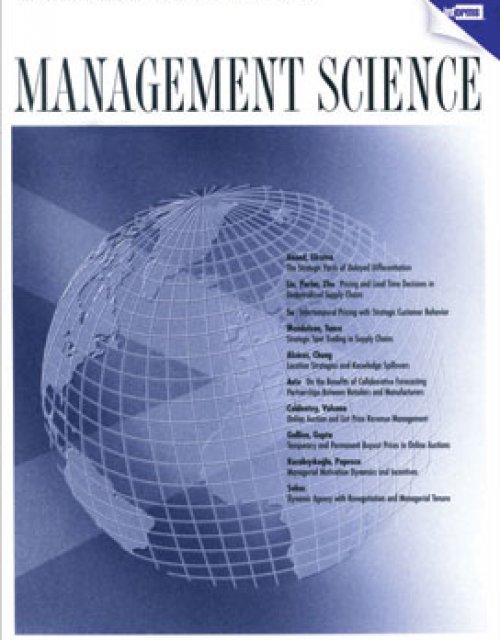Publication records
Subject(s)
Marketing
Keyword(s)
marketing, supply chain, CSR communication, stakeholder marketing, fair trade
JEL Code(s)
M31
A pdf file of this working paper may be available at INSEAD.
Pages
41
Subject(s)
Strategy and general management
Keyword(s)
CSR, stakeholders, business case
By engaging in corporate social responsibility (CSR) activities, companies can not only generate favorable stakeholder attitudes and better support behaviors, but also, over the long run, build corporate image, strengthen stakeholder-company relationships, and enhance stakeholders' advocacy behaviors. However, stakeholders' low awareness of and unfavorable attributions towards companies' CSR activities remain critical impediments in companies' attempts to maximize business benefits from their CSR activities, highlighting a need for companies to communicate CSR more effectively to stakeholders. In light of these challenges, a conceptual framework of CSR communication is presented.
© 2010 Blackwell Publishing Ltd and British Academy of Management
Volume
12
Journal Pages
8–19
Subject(s)
Strategy and general management
Keyword(s)
strategy, value based management, performance measurement, controlling, cash management
Subject(s)
Economics, politics and business environment
Keyword(s)
electricity, market definition, market power, prices
This study analyses the geographic integration of electricity wholesale markets with a focus on Germany and its neighbouring countries. We employ various indicators based on publically available data and find that electricity markets have become more integrated since the sector inquiry undertaken by the European Commission in the years preceeding 2006. However, European markets are not yet fully integrated. The results also suggest that stronger (and costly) integration towards certain countries may have only little or adverse effects on electricity wholesale prices in Germany. Finally, in the past, German electricity wholesale prices have appeared too low so as to trigger investments into new generation capacity. To that end prices do not appear inflated.
Pages
91
ISSN (Print)
1866–4016
Subject(s)
Finance, accounting and corporate governance
Keyword(s)
value based management, capital budgeting, business plan, risk management, discounted cashflow analysis
Subject(s)
Strategy and general management
Keyword(s)
international career, global career, general management
Volume
55
Subject(s)
Human resources management/organizational behavior
Keyword(s)
Berufserfolg, Betriebswirtschaftslehre, Persönlichkeitspsychologie, Psychopathie, Wirtschaftspsychologie
Secondary Title
Sicherheit in Organisationen
Pages
199–218
Subject(s)
Economics, politics and business environment
Volume
62
Journal Pages
6–8
Subject(s)
Technology, R&D management
Keyword(s)
technology partnerships, trust, relational quality
JEL Code(s)
M19
The purpose of this paper is to propose a framework for the monitoring of new technology introduction in a B2B environment. We focus on B2B environments, i.e. on projects where a new technological solution is implemented (and often jointly developed) with a client being either a company or an organization. In such a situation, where a supplier and its client agree to implement a new technology, both are exposed to a risk. The management of these risks can be handled through a couple of approaches: control or trust. The management literature has put a lot of attention on these two modes that play an important role because they drive the quality of the relationship between partners. We will explore their respective roles and build a methodology to monitor them along the life of a buyer-supplier relationship aiming at implementing new technology.
View all ESMT Working Papers in the ESMT Working Paper Series here. ESMT Working Papers are also available via SSRN, RePEc, EconStor, and the German National Library (DNB).
Pages
22
ISSN (Print)
1866–3494
Subject(s)
Marketing
Keyword(s)
ambiguity, brand preference, decisions under uncertainty, multiattribute choice
We propose that ambiguity aversion, as introduced in the literature on decision making under uncertainty, drives a preference for established brands in multiattribute choices among branded alternatives. Established
brands are those for which belief in quality is held with greater confidence, even if specific attributes might be inferior to those of competing, less-established brands. In five experiments, we examine the role of ambiguity aversion in the preference for dominated, established brands. We first show a correlation between ambiguity aversion (revealed through choices among monetary lotteries) and the preference for established brands. We then show that the preference for established brands is enhanced when ambiguity aversion is made more salient in unrelated preceding lottery choices. Thus, ambiguity aversion carries across choices. In addition,
ambiguity aversion and the preference for established brands are both enhanced when subjects anticipate that others will evaluate their lottery choices. Finally, ambiguous information about brand attributes tends to
increase the preference for established brands.
© 2009 INFORMS
Volume
55
Journal Pages
1933–1941
ISSN (Online)
1526-5501
ISSN (Print)
0025–1909
